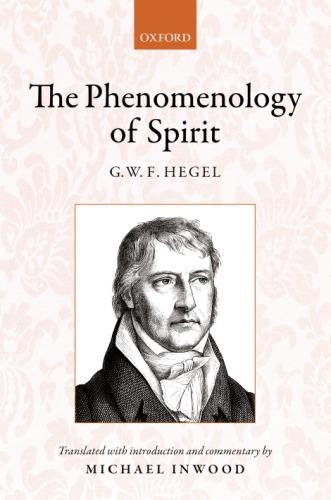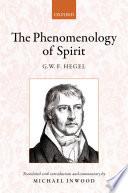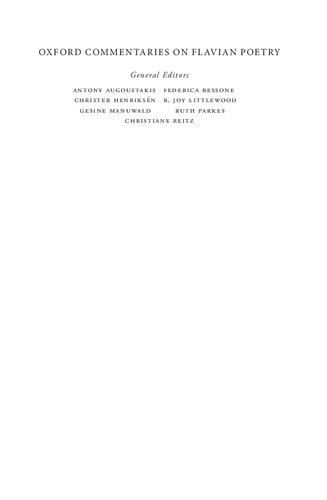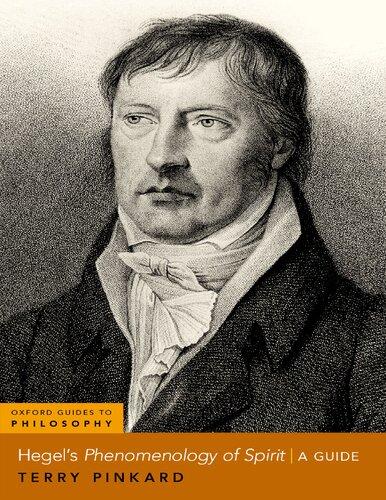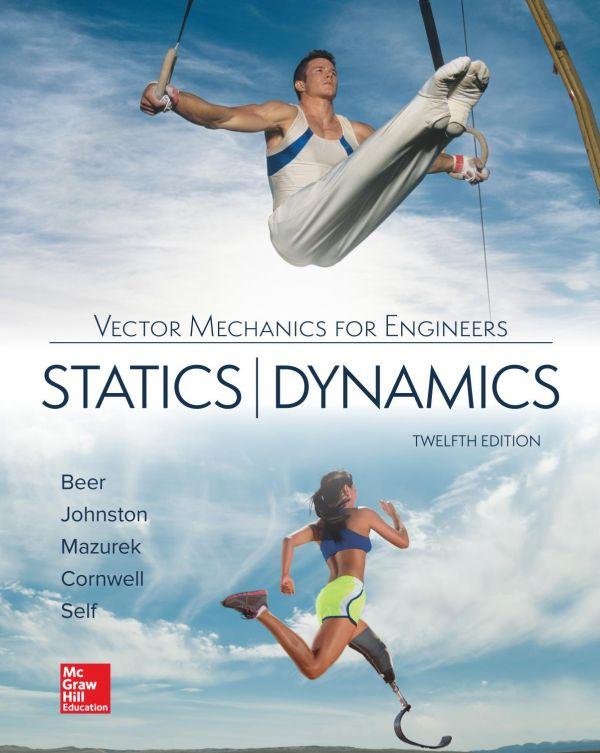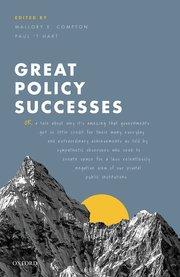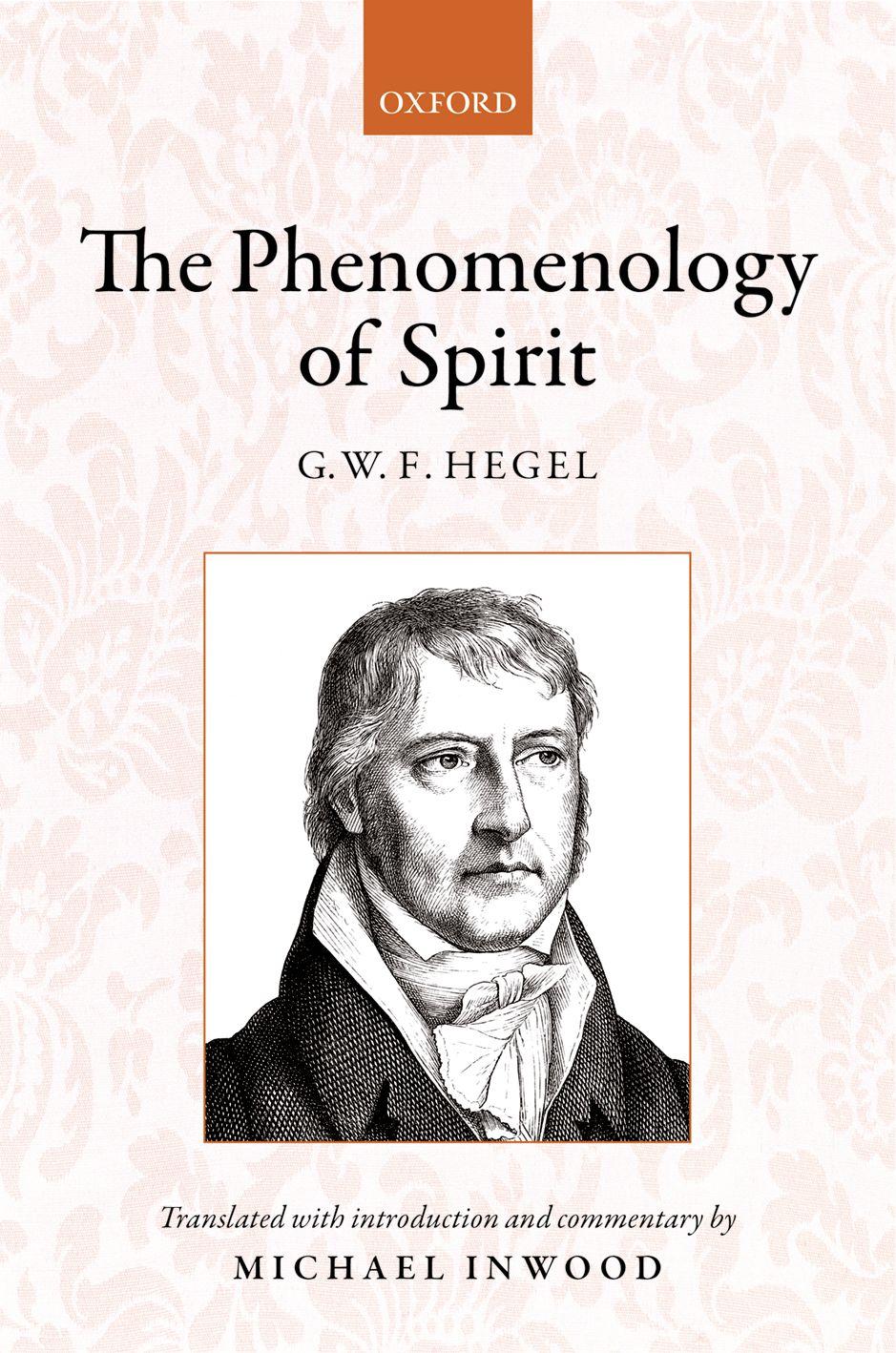ThePhenomenologyofSpirit:Translationwith IntroductionandCommentaryG.W.Hegel
https://ebookmass.com/product/the-phenomenology-of-spirittranslation-with-introduction-and-commentary-g-w-hegel/
Instant digital products (PDF, ePub, MOBI) ready for you
Download now and discover formats that fit your needs...
Hegel: the Phenomenology of Spirit G.W.F Hegel
https://ebookmass.com/product/hegel-the-phenomenology-of-spirit-g-w-fhegel/
ebookmass.com
Valerius Flaccus: Argonautica, Book 8: Edited with Introduction, Translation, and Commentary Cristiano Castelletti
https://ebookmass.com/product/valerius-flaccus-argonauticabook-8-edited-with-introduction-translation-and-commentary-cristianocastelletti/
ebookmass.com
Hegel's Phenomenology of Spirit Pinkard
https://ebookmass.com/product/hegels-phenomenology-of-spirit-pinkard/ ebookmass.com
Vector Mechanics for Engineers 12th Edition Ferdinand Pierre Beer
https://ebookmass.com/product/vector-mechanics-for-engineers-12thedition-ferdinand-pierre-beer/
ebookmass.com
Robbins & Cotran Pathologic Basis of Disease (Robbins Pathology) 10th Edition Kumar
https://ebookmass.com/product/robbins-cotran-pathologic-basis-ofdisease-robbins-pathology-10th-edition-kumar/
ebookmass.com
A Problem Princess Anna Harrington
https://ebookmass.com/product/a-problem-princess-anna-harrington-2/
ebookmass.com
Sandbows and Black Lights: Reflections on Optics Stephen R. Wilk
https://ebookmass.com/product/sandbows-and-black-lights-reflectionson-optics-stephen-r-wilk/
ebookmass.com
A Game of Retribution Scarlett St. Clair
https://ebookmass.com/product/a-game-of-retribution-scarlett-stclair-7/
ebookmass.com
Practice Makes Perfect: Intermediate Spanish Grammar, Premium Second Edition Gilda Nissenberg
https://ebookmass.com/product/practice-makes-perfect-intermediatespanish-grammar-premium-second-edition-gilda-nissenberg/
ebookmass.com
Great Policy Successes 1st Edition E. Compton
https://ebookmass.com/product/great-policy-successes-1st-editionmallory-e-compton/
ebookmass.com
Hegel:ThePhenomenologyofSpirit Hegel:The PhenomenologyofSpirit G.W.F.Hegel T
MichaelInwood GreatClarendonStreet,Oxford,OX26DP, UnitedKingdom
OxfordUniversityPressisadepartmentoftheUniversityofOxford. ItfurtherstheUniversity’sobjectiveofexcellenceinresearch,scholarship, andeducationbypublishingworldwide.Oxfordisaregisteredtrademarkof OxfordUniversityPressintheUKandincertainothercountries
©MichaelInwood2018
Themoralrightsoftheauthorshavebeenasserted
FirstEditionpublishedin2018
Impression:1
Allrightsreserved.Nopartofthispublicationmaybereproduced,storedin aretrievalsystem,ortransmitted,inanyformorbyanymeans,withoutthe priorpermissioninwritingofOxfordUniversityPress,orasexpresslypermitted bylaw,bylicenceorundertermsagreedwiththeappropriatereprographics rightsorganization.Enquiriesconcerningreproductionoutsidethescopeofthe aboveshouldbesenttotheRightsDepartment,OxfordUniversityPress,atthe addressabove
Youmustnotcirculatethisworkinanyotherform andyoumustimposethissameconditiononanyacquirer
PublishedintheUnitedStatesofAmericabyOxfordUniversityPress 198MadisonAvenue,NewYork,NY10016,UnitedStatesofAmerica
BritishLibraryCataloguinginPublicationData
Dataavailable
LibraryofCongressControlNumber:2017954184
ISBN978–0–19–879062–4
Printedandboundby CPIGroup(UK)Ltd,Croydon,CR04YY
LinkstothirdpartywebsitesareprovidedbyOxfordingoodfaithand forinformationonly.Oxforddisclaimsanyresponsibilityforthematerials containedinanythirdpartywebsitereferencedinthiswork.
Editor’sIntroduction IthasbeensaidthatthedifferencebetweenNietzscheandHegelisthatwecanunderstand Nietzsche’sindividualsentences,butnotwhatheissayingoverall,whereaswithHegelitis theotherwayaround:wecanunderstandwhatheissayingoverall,butnothisindividual sentences.Thisdictumisoveroptimisticasfarasthe PhenomenologyofSpirit isconcerned.Notonlyareitsindividualsentencesoftenobscure,ifnotimpenetrable,itisfar fromclearwhatthebookisaboutoverall.Theproblemsbeginwiththetitle.Inconformity withitsderivationfromtheGreekwords phainomai (‘ appear ’)and logos (‘account, reason,etc.’) ‘phenomenology’ means ‘studyofappearance(s)’.But ‘ appearance ’ is ambiguous.Itmaymeantheemergenceormanifestationofsomething(‘Hegel’sbook appearedin1807’ , ‘Hishonestywasquiteapparent’)oritmaymeanthewaysomething seemsincontrasttothewayitreallyis(‘Hegel’sbookappearstosolveallphilosophical problems’ , ‘Hishonestywasonlyapparent’).Hegeluses ‘ appearance ’ (Erscheinung)and theverb ‘toappear’ (erscheinen)inbothways.1 Whatappearsis Geist. Geist istheusual Germanwordfortheintellectualaspectofanindividual,themind,butinthe Phenomenology itmorecommonlyreferstothecollectivemindor ‘spirit’ sharedbyagroupof people.Itis,asHegelmemorablyputsit, ‘I thatis We,and We thatis I ’ (PS¶177).Itcan alsorefertothethirdpersonoftheTrinity,theholyspirit,andthisreligiousconnotationis neverfarfromHegel’smindwhenheusestheword Geist.Spiritappearsonthescenein thecourseofthe Phenomenology,butitdoesnotappearallatonce,asdoes,say,abook,or apersononmydoorstep.Itratherpresentsaspectsofitself,fragmentaryappearancesin whichfully fledgedspiritisnotrevealedasawhole,butcanbeseeninretrospectasthe sourcefromwhichtheystem:see¶¶38,47,and440.
InSearchoftheAbsolute Tolearnmoreaboutthesubject-matterofHegel’sbook,weneedtoturnnottothe long ‘Preface ’ withwhichitbegins,buttotheshorter ‘Introduction’ thatfollowsit. ThePrefacewaswrittenafterHegelhadcompletedtherestofthebookandwas meantasanintroductionnotonlytothe Phenomenology,buttothewholephilosophicalsystemtowhichthe Phenomenology wasoriginallyintendedasanintroduction.ThePrefaceisthusmorecloselyconnectedwiththeconcludingparagraphs ofthebook,whichpresenthiswholesysteminoutline,thanitiswiththeearlier stagesofthework.2 TheIntroductionraisesaproblemtowhichthe Phenomenology
1 Whenanordinarywriterusesawordthatisassignedmorethanonemeaninginthedictionary,we normallyassumethats/heisusingitinonlyoneofthesemeanings.ButHegelisnotanordinarywriterand heoftenhasinmindmorethanonemeaningofawordwhenheusesit.Hisintentionistounearthdeep andsignificantconnectionsbetweenseeminglydisparateconcepts.Astrikingexampleofthisprocedureis hisuseof aufheben, ‘sublate’,inallitssensesatonce: ‘elevate’ , ‘destroy’,and ‘ preserve ’,i.e. ‘kickupstairs’
2 Strictlyspeaking,thePrefaceshouldbereadattheendofthebookratherthanthebeginning.Inhis commentary,QuentinLauer(1992)adoptsthisorder,leavingthePrefaceuntillast.
purportstoprovideananswer,namely:canweknowthe ‘absolute’ and,ifso,how? TheproblemarosewithparticularpoignancyinthewakeofKant’ s CritiqueofPure Reason (1781)whichhadarguedthatwecannotknow ‘thingsinthemselves’,rockbottomreality,butonlythingsasthey ‘ appear ’ tous.3 Traditionally,therealmof thingsinthemselveshadbeensupposedtobepopulatedbyvarioussupernatural entities,Godorgods,andoneofthemotivesofKant’ s ‘transcendentalidealism ’ was toleaveaspaceopenforsuchentities.Kantargues,forexample,thatifwebelieve thatGodandHisknowledgeoftheworldareatemporal,thenwemustregardtimeas ideal,andnotasafeatureofrock-bottomreality(CPR,B71–72).Religiousbeliefis, however,amatternotofknowledge,butoffaith,afaiththatisrequiredif,asKant did,wetakemoralityseriously.(ForHegel’scriticismofthis,seehisaccountofthe moralworld-viewinthe Phenomenology ¶¶599ff.)AccordingtoHegel,suchscepticismaboutourknowledgeoftheabsolutepresupposesthatourcognitiveequipment islikean ‘instrument’ or ‘medium’ or,aswemightanachronisticallysay,acamera, whichmaydistortourpicturesoftheabsolute.Thereisnowayinwhichwecould,by inspectingthepicturesofsuchaglobalcameraandcomparingthemwithreality, discoverthedistortionitintroducesandmakeallowanceforit.Icannotstepoutside myownconsciousnesstosurveyandassessitfromanexternalstandpoint.4
However,thecamera-modelofcognitionisdefectiveinseveralrespects.First,it postulatesariftbetweenmyselfandmycognitiveequipment,betweenthephotographerandthecamera.Butthephotographercannotbewhollydenudedof primary cognitiveequipmentindependentofthecamera.Ihave,afterall,toinspectthe picturessuppliedbymycameraandtoaskwhethertheyareveridicalornot.If Icannotrelyonthisprimaryequipment,moreintimatelyconnectedwithmyself thantheother,Ihavenobasisforraisingscepticaldoubtsaboutthereliabilityofmy secondarycognitiveequipment.5 Ialsoneedthisprimaryequipmenttohaveknowledgeofmyself,includingthecamera-modelofmyowncognition unlesswe suppose(asKantineffectdid)thatItakeunreliableselfieswithmysecondary equipment.AnadequateaccountoftheSelfmustexplainmyabilitytogivethat account.Herewehave,ineffect,twoSelves,onethathasaviewoftheworldand anotherthathasareliableview,notoftheworlditself,butofthatviewoftheworld, andraisesscepticaldoubtsaboutit.
3 Itistemptingtoparaphrase ‘theabsolute’ as ‘mind-independentreality’.Nodoubttheabsolute would be independentofminds,ifthere were nominds.Butsincetherearemindsandtheabsoluteisresponsible forthem,mindscannotbeindependentoftheabsoluteand,conversely,theabsolutecannotbeentirely independentofminds.Moreover,inHegel’sview,therenecessarilyareminds,sincetheabsolutemustbe knownbyminds.Heneverconsidersthepossibilitythattheremighthavebeennohumanminds.
4 NomorecanI,Hegelbelieves,stepoutsidemyownethicalorderinordertoassessitfromaneutral standpoint.See¶437,wheretheattempttoestablishlawsforone’ssociety,ortotestthelawsthatarealready inplace,isimplicitlycriticizedforitspretensiontooccupyinganArchimedeanpointoutsideone’ssociety.
5 Cf.Hume(1975:pp.145f.(¶116)): ‘Thereisaspeciesofscepticism, antecedent toallstudyand philosophy ...It recommendsanuniversaldoubt,notonlyofourformeropinionsandprinciples,but alsoofourveryfaculties;ofwhoseveracity,saythey,wemustassureourselves,byachainofreasoning, deducedfromsomeoriginalprinciple,whichcannotpossiblybefallaciousordeceitful.Butneitheristhere anysuchoriginalprinciple,whichhasaprerogativeaboveothers,thatareself-evidentandconvincing;orif therewere,couldweadvanceastepbeyondit,butbytheuseofthoseveryfaculties,ofwhichweare supposedtobealreadydiffident.’
ButtherearefurtherSelvesinplaytoo.For,secondly,thecamera-modelneglects thefactthatIamonlyoneamongverymanysimilarSelvesandthatmyknowledgeof theworldwouldbeintolerablyimpoverishedifIcouldnotsupplementmyown meagre first-handexperienceofitwiththetestimonyofotherSelveswhoperceive partsoftheworldthatIdonotandfromviewpointsthatIdonotoccupy.Howdoes thecamera-modelaccommodateotherSelves?Doesitlapseintosolipsism,regarding othersnotasSelvesonaparwithmyself,butsimplyasentitiesrecordedbymy camera?Ordoeseachofushaveacameraofourown?Ordoweallviewtheworld throughasingleglobalcamera?Eachofthesealternativesinvolvesdifficulties, difficultiesthathadnotbeensquarelyconfrontedbyKant,whodistinguished betweenmyselfandothers,between ‘I’ and ‘ we ’,onlyinhisethicalwritings,but notinhistheoreticalphilosophy.6 Hegel,bycontrast,isvividlyawareofthedistinctionbetweenoneselfandothers,andseemstorepairthisdeficiencyinKant.Other SelvesplayatleasttworolesinHegel’senterprise.First,they figurewithinsome,if notall,oftheshapesofconsciousnessthatHegelgoesontoconsider,mostvividlyin hisaccountofself-consciousnessinchapterIV.7 Secondly,theyareresponsiblefora pressingscepticalproblemthatHegelattemptstoovercomeinthe Phenomenology:if othersholdaviewdifferentfrommyown(orfrom ‘science ’),howcanIsettlethe disputeinmyownfavourwithoutbeggingthequestion?8
Thirdly,thecamera-modeldifferentiatestheSelfanditscamerafromtheabsolute itself.Buthowcanthatbe?Iftheabsoluteisgenuinelyabsolute,itcannotbesheerly distinctfromSelveswiththeircamerasandphotographs.Ifitwere,therewouldbe twoabsolutesmysteriouslydisconnectedfromeachother,sinceSelvesandtheir picturesundoubtedlyexist:theycannot,oratleast I cannot,beyetonemoreillusory appearance.TheSelves,theircameras,andphotographsmustratherbeoffshootsofthe absolute,sentdownbytheabsoluteitself.ItisopentodisputewhetherHegelbelieved insuchathingastheabsolute.Butwhatisnotindisputeisthathedidnotbelieveinan absolutethatisseparatefromhumanknowers.Anyabsoluteworthyofitsnamemust encompassandaccountforthemindsthat,howeverimperfectly,knowtheabsolute, andtheonwardadvanceofthe Phenomenology isinlargepartdrivenbythequestfora typeofknowledgethatincorporatestheknowerinwhatisknown.9
6 BishopBerkeley,bycontrast,assignedtominds,includingmindsotherthanone’sown,amoresolid ontologicalstatusthanthatofmaterialobjects.Thebeingofmaterialthingsissimplytobeperceived,both byusandbyGod,butthebeingofamindconsistsinperceiving.ThoughwedependonGodforour existence,wearenotsimplyideasinthemindofGod.However,thisconflictswithhisempiricist argumentsforhisoveralldoctrine,someofwhich suchashisargumentthatIcannotimagineatree thatisnotperceived byme tendtowardssolipsism.
7 Itmustbeadmitted,however,thatthedistinctionbecomessalientinpoliticalandethicalcontextsof thework,beginningwithchapterIVon ‘self-consciousness’,andisrelativelysubduedinthemore theoreticalpartsofthework,suchaschaptersI–IIIon ‘consciousness’ andchapterV.Aontheoretical reason.
8 ThisproblemisexaminedbyForster(1989).Hegel’ssolutiontoitis,roughlyspeaking,totakehis opponentsonboardandincorporateamodifiedversionoftheirviewsintohisown.Pastphilosophiesand pastshapesofconsciousnessarenotsimplyrejected,butare ‘sublated’ or ‘kickedupstairs’:thetruthin themisintegratedintotheirsuccessors,especiallyintoHegel’ sown ‘science’ .
9 Thisisaproblemfacednotonlybyanidealist,suchasHegel,butalsobyamaterialist.Insofarasa materialistregardsmatterorenergyastheabsolute,s/hemusttreat ‘matter’ notassimplycontrastingwith ‘mind’,butasabletoaccommodateandaccountforminds,alongwitheverythingelse.
Hegel’sResponse Despitethesedeficienciesofthecamera-modelintermsofwhichtheproblemofthe absoluteisposed,theproblemstillremains.Thederivationofourconceptsand beliefsfromtheabsoluteitselfdoesnotentailthattheyareappropriateortrue. Illusionsanderror,aswellastruths,muststemfromtheabsolute.Howcanweknow which,ifany,ofourbeliefsaboutultimaterealityaretrueandwhicharefalse?Hegel proposesthefollowingsolution:weshouldconsider,notdirectlytheabsoluteitself, buttheseriesofformsor ‘shapes’ ofconsciousnessthathaveoccurredinour attemptstograsptheabsolute.10 Eachshapeofconsciousness apartfromthelast, scienceitself,Hegel’sownsystem11 fallsshortofthetruth,butHegel’sstrategyisto advancetowardsthetruthbyusingerrorsassteppingstones nottoavoiderrorat allcosts(asDescartesattemptedtodo),sinceerrorsare,forHegel,neversheererrors, butalwayscontainagrain,ormore,oftruth.Webeginwiththesimplestshape,the immediatesensoryawarenessofindividualentities.Thiscollapses,butnotbecause Hegelcriticizesit:thatwouldallowHegel’sopponentstoclaimthatherejectssensory certaintyonlybecauseofitsfailuretosatisfyacriterionthat he choosestoapplytoit, acriterionthatsensorycertaintyitselfmightnotacknowledge.Sensorycertainty collapsesbecauseitfailstomeetacriterionthat ititself endorsesandappliestoitself. Sensorycertaintycandothisbecause,asHegelsaysin¶85, ‘consciousnessisonthe onehandconsciousnessoftheobject,ontheotherhandconsciousnessofitself; consciousnessofwhattoitisthetrue,andconsciousnessofitsknowledgeofthetrue. Sincebothare forconsciousness,consciousnessitselfistheircomparison;itbecomesa matter forconsciousness whetheritsknowledgeoftheobjectcorrespondstothe objectornot.’ Thesense-certainconsciousnessbecomesawareofaconflictbetween whatitsobjectspurporttobe,pureindividuals,anditsownwayofgettingtoknow them,bytheuseofuniversalterms(suchas ‘this’ , ‘here’,and ‘ now ’),termswhich therefore(inHegel’sview)captureonlyuniversals,nottheindividualstheyaimed for.Fromthedebrisofsensorycertaintythereemergesanewshapeofconsciousness, perceptionofthingswithproperties.Hegelhimselfpurportstoplaynomorepartin itsemergencethanhedidintheassessmentofitspredecessor.Thisnewobjectof consciousnessis,hetellsusin¶87, ‘theknowledgeofthe firstobject’,thatis,sensory certainty’sillicituniversalknowledgeofitsindividualobjectsbecomestheobjectof thenextshapeofconsciousness,thethingwithitsuniversalproperties.InHegel’ s view,anygivenshapenecessarilyhasanimmediatesuccessor,andnecessarilyhasthe immediatesuccessoritdoeshave:theknowledgeofitsobjectacquiredbyshapeof consciousness n becomestheobjectofshapeofconsciousness n+1.Hegelhimself playsnopartindecidinghowthesequenceistoproceed:hisroleissimplythatofan onlooker.Hedoes,however,seethingsthattheshapesofconsciousnessthemselves
10 ‘Shape’ translates Gestalt throughout.Itistempting,andperhapsclosertoHegel’smeaning,to translate Gestalt as ‘form’,butthisisexcludedbythefactthatinothercontextsHegelalsousestheword Form,anearsynonymof Gestalt,butnotanexactsynonym.
11 Theword ‘science’ (Wissenschaft)isusedmorewidelyinGermanthaninEnglish.Whatwewould call ‘art-history’,forexample,isinGerman ‘art-science’ (Kunstwissenschaft).WheneverHegelspeaksof ‘science’ inthe Phenomenology,however,hemeanstheidealphilosophy,i.e.thephilosophythatheaspires todevelop.
donot.Hegel(or ‘ we ’)canseethat,andhow,perceptionemergedfromsensory certainty,butneitheroftheseshapescanseethis:see¶87.Iftheyknewasmuchas Hegelknows,theywouldhavetheconceptualresourcesofHegel,andwouldamount to ‘absoluteknowledge’ itselfratherthansimplyrungsontheladdertowardsit. Perception,inturn,undergoesafatesimilartothatofsensorycertainty,andislikewise supplantedbyanothershape,understandingandforce.Afterthat,thereisamore abrupttransition,lesseasytocomprehendthantheprevioustwoandseeminglyless conformabletothestrategyHegeloutlinesintheIntroduction.Thisisthetransition from ‘Consciousness’ inchaptersI–IIIto ‘Self-consciousness’ inchapterIV,whichis notonlyadifferent ‘shape’ (Gestalt),butalsoanew ‘ configuration’ (Gestaltung), groupingtogetherseveralrelated ‘shapes’,incontrasttothoseofthe firstconfiguration inchaptersI–III.12 Unlikethe firstthreeshapes,whichhavenoobvioushistorical setting,butonlyalogicalorder,theshapesfallingundertheheadingofselfconsciousnessformaroughhistoricalsequence:thestruggleforrecognitionandthe ensuingenslavementremindusoftheancientworldorperhapsofthestateofnature, StoicismandscepticismdevelopedintheHellenisticandRomanperiods,while unhappyconsciousnessrecallsearlyChristianity,thoughallfourshapesoccasionally resurfaceinsubsequent,andhistoricallylater,shapesofconsciousness.Reason,in chapterV,formsanotherconfiguration,butisdividedintothreesections theoretical, practical,andacombinationofthetwo.Theoretical(or ‘observing’)reasonmaybe goodenoughfordealingwithinorganicandorganicnaturebutit flounderswhenit comestothehumanSelf:see¶¶309ff.TodealwiththeSelf,reasonneedstobecome practical.Neitherreason,noritssubsections,haveanyspecifichistoricallocation. Historybeginsinearnestwith Geist inchapterVI,whichrangesfromtheGreek city-state(asportrayedinGreektragedy)downtotherevolutioninFranceandthe contemporaneousdevelopmentofindividualisticmoralityinGermany.Spiritgathers uptheprecedingshapesofconsciousnessandpresentstheiremergenceinhistory:see e.g.¶¶295,440f.,and446.Finally,Religion,inchapterVII,introducesanewhistorical sequence,whichbeginswithZoroastrianism-cum-Judaism(see¶720)andendswith Lutheranism,onthebrinkofitstransformationintoHegelianphilosophy.Inhis final chapter,VIII,Hegelstressestheunfoldingoftheshapesofconsciousnessinhistory(see ¶¶803and808).Buttheseriesofshapesinthe Phenomenology correspondstonosingle temporalsequence.Theirorderingisprimarilylogicalandonlyoccasionallydoesthe logicalordermeshwithahistoricalorder.
Hegelbelievesthattheprocesswherebyeachshapeofconsciousnessgeneratesits immediatesuccessor thateachshape’sknowledgeofitsobjectbecomestheobject ofthenextshape guaranteesthecompletenessoftheshapesofconsciousnesshe presents:see¶79.Thisissomewhatoveroptimistic,bothbecauseitisnotobviousthat theprocessinquestiondoesensurecompleteness afterall,theprocesswhereby numbersaregeneratedbybeginningwith0andcontinuallyapplyingtheoperation ‘+1’ doesnotcaptureallthenumbersthereare andbecauseHegel’sapplicationof theprocedurebecomesmoreperfunctory,oratleastlessscrutable,asthe
12 IntheIntroduction,¶78,Hegelseemstouse Gestaltung inthesamewayas Gestalt.Butlaterinthe work,heusesittorefertolargergroupsofrelated ‘shapes’:see¶447.
Phenomenology proceeds.ButeveniftheprocessthatHegelapplied(or,rather, ‘considered’—inviewofhisnon-interventioniststance)wereguaranteedtoomit noshapeofconsciousness,itwouldnotfollowthatconsciousnessoftheabsolute itselfwastobefoundamongthem.Foreveniftheabsoluteitselfisultimately accessibletohumanconsciousness, 13 thereislittlereasontosupposethatourquest foritwillevercometoanendandnotcontinueindefinitely(asnumber-generation does),turningupnewshapesofconsciousnessthatHegelneverlivedtoconsider.14
TheAbsoluteUnmasked? Hereweneedtoask:doesHegelanswer,orevenattempttoanswer,thequestion abouttheabsolute?IntheIntroduction,heseemstohavedismissedthequestion, alongwithitspresuppositions,andtohaveturnedtoaquitedifferentsubject,our successiveviewsoftheabsolute.Howcouldanaccountofourviewsoftheabsolute tellusanythingabouttheabsoluteitself?Oursuccessivediverseviewsabout,say,the atomsurelydotellusmoreaboutatoms,sincetheyaresupportedbyappropriate empiricalevidenceandareregardedascontinuallyapproximatingclosertothereal natureoftheatom,evenifthereisnoguaranteethatourknowledgeofitwilleverbe complete.Buttheabsoluteisnotsusceptibletoempiricalinvestigationintheway thatatomsare.Anyempiricalevidencewehaveofthenatureofrock-bottomreality canbedismissedbytheKantianscepticassimplyevidenceconcerningappearances, atomsincluded,andirrelevanttothenatureoftheunderlyingabsolute.Atthispoint, Hegelmighthaveconcededthattheinvestigationofsuccessiveviewsoftheabsolute issimplythebestwecandoandthatwecanneverreachtheabsoluteitself.Thisis notwhathedoes,however.Contrarytoourearliersupposition,hedoesnotbelieve thatshapesofconsciousnessproceedindefinitely.Theyadvancetowardsagoal: ‘the goal is fixedforknowledgejustasnecessarilyasthesequenceoftheadvance;itis situatedwhereknowledgenolongerneedstogobeyonditself,whereknowledge finds itself,andtheconceptcorrespondstotheobjectandtheobjecttotheconcept.Sothe advancetowardsthisgoalisalsorelentless,andnosatisfactionistobefoundatany earlierstation’ (¶80).Generallyspeaking,eachshapeofconsciousness findsitselfto beunsatisfactoryandgiveswaytoamorecomplexandsatisfactoryshape,whichis the ‘truth’ ofitsimmediatepredecessor,not,thatis, the truthunqualified,sincethis newshapetoowill finditselfunsatisfactoryinturn,butwhatthepredecessorreally amountstoandwhatprovidesaresolution,albeittemporary,ofitsdifficulties.No suchdefectiveshapeofconsciousnesscanrevealtheabsolute,notonlybecauseofits defects,themismatchbetweenobjectandconcept,butalsobecauseitisnecessary, evenpossible,togo beyond it:nolowershapeofconsciousnesscanexpressthefull potentialoftheabsolute ’sgenerativepower.Sothe finalshapeofconsciousnessmust
13 Inasense,Hegelhimselfacceptsthattheabsoluteisnotaccessibletohuman consciousness,sincehe believesthatinsofarasthereisanabsoluteatall,itisthepurethoughtsofhislogic,whichformthe scaffoldingbothofnatureandofthemind.Whenonethinksabout,andintermsof,thesethoughts,oneis not ‘conscious’ inHegel’ssense,sincethethoughtsarenotanobjectdistinctfromoneself.
14 Stekeler(2014)argues,reasonablyenough,thathumanity’squestfortruthisnever-ending,buthis attributionofthisviewtoHegelismorecontroversial.
beunsurpassable,suchthatitneitherneedstobe,norcanbe,supplantedbyanother shapethatamountstothe ‘truth’ ofit.Hegel’spresentationofthis finalshapeistwopronged.Itisso,becausesomethinglikeadistinctionbetweenthephenomenalworld andtheabsoluteoccursnotonlyinthemindsofusphenomenologicalphilosophers surveyingthesuccessiveshapesofconsciousness,butalsowithintheshapesof consciousnessthemselves.Thisisthedistinctionbetweenworldlylife,thehistory ofwhichissurveyedinchapterVI(‘Spirit’),andreligion,thehistoryofwhichis recordedinchapterVII(‘Religion’).Religion,asHegelconceivesit,isoursharedselfconsciousness,incontrasttotheconsciousnessofourworldlylife.Hencetheworldly shapesofconsciousnessthatappearhistoricallyinchapterVIareaccompaniedbya religion,postulatingadivisionbetweenthesocialworldandarelativelydeterminate absolute.ThisistrueoftheGreekworld(¶¶446ff.,699ff.)andespeciallyoftheperiod fromthemedievalworlddowntotheFrenchrevolution(¶¶487,528ff.).Thehistory ofreligionsinVIIcorrelatesonlyveryroughlywiththehistoryofworldlyconsciousnessinVI,buttheir finalstagesneatlycoincide.ChapterVIendswiththe ‘beautiful soul’ (see¶¶658ff.and795),theconscientiousindividualwhoformsthebasisofthe newStatethatisbeginningtoemergeinthewakeoftheFrenchrevolution,15 aState thatgivesdueweightbothto ‘ethicallife’,orcommunalsocialmorality,andtothe individualmoralconscience incontrasttotheancientcity-state,whichmerged theindividualwithethicallife,andtotherevolutionaryorderofabsolutefreedom, whichrecognizedonlytheindividualcitizen,guided,ifbyanythingatall,onlyby individualisticmoralityandnotbyanyobjectiveethicalorder.Thebeautifulsoulis self-containedandautonomous.Inhisconscienceandinhisenvironingethical society,hehasallheneedsforthemoralmanagementofhislife.Hedoesnotneed tolooktoheavenforguidance.Conversely,theconcludingstageofreligion,Lutheran Christianity,descendstomeetthebeautifulsoul.Christianityis ‘manifest’ or ‘revealed’ religion,thatis,thereligionthatisentirelyopenandaboveboard,in whichtheabsolutedisclosesitselftomankind.Thisisanessentialcharacteristicof GodHimself GodcannotbeGodunlessHeisknowntohumans,sincehumansare anessentialaspectofGod.Thisreligionalsoprovidesagratifyingmodelofthewayin whichtheshapesofourconsciousnessareinvolvedintheabsoluteitself:theyare,as itwere,rungsofaladderthrowndowntousbyGodHimself,becauseofHisneedto beknownbyus.ButthisreligionbringsGoddowntoearthintheformofaman,and subsequentlysituatesHim,astheholyspirit,intheChristiancommunityratherthan inaremoteheaven. ‘Godisdead’,Hegelproclaims(¶¶752,785),anticipating Nietzsche,buthimselfanticipatedbyLutheranhymnistsandnomoreintending hisdictumasanunequivocaldeclarationofatheismthantheydid.Conversely,man, intheformofthebeautifulsoul,hasrisentomeetGodhalfway.Incontrastto Descartes,andtomanyanotherphilosopher,HegeldoesnotregardtheSelfas fixed anddeterminate,andinparticularnotasafree- floatingego.Itundergoesatransformingeducationinparallelwiththechangesinitsobjectsandinitsattitudes towardsthem.The Phenomenology is,amongotherthings,aquestforanadequate
15 In¶¶658ff.Thebeautifulsoulispresentedasadead-end,whohasdwindledawaybecauseofhisinertia. Hisreappearancein¶¶795–7asacruciallinkbetweenearthandheavenissurprisingandhardtoexplain.My ownexplanationisthereforeconjecturalandcontroversial.
conceptionoftheSelf.TheconsciousSelfisitselfanoffshootoftheabsolute,and everyshapeofconsciousnessinvolvesaconceptionnotonlyofitsobject,butalsoof theSelfandofitsrelationshiptoitsobject.Itdoesnotfollow,however,thatevery shapeinvolvesanadequateconceptionofitsownSelf.Ingeneral,anadequate conceptionoftheSelfofshape n isprovidedonlybyitssuccessor, n+1,sothat ‘knowledge...needstogobeyonditself ’ inorderto ‘finditself ’.Ashapeadequateto theabsolutemustprovidetheSelfwithanadequateaccountofitself,andnotleaveit totheimmediatelysuccessiveshapetoprovidesuchanaccount.16 Onlyafterthis longeducationareweina fitstatetofusewiththesimilarlytransformeddeity.Thus Godbecomesmanand,conversely,manbecomesGod.Theabsolute,Hegelbelieves, hasatlastcomedowntoearth.
WhoAmI? Thissolutionmaywellleaveusdissatis fied.Foronething,itgivesadisconcertingly parochialaccountofthehumanizationoftheabsolute.Whyshouldweregardthe religion,andtheidealizedcitizen,ofearly19th-centuryGermanyastheappropriate juncturefortherevelationoftheabsolute?Whyshouldweevenacceptthisreligion’ s accountoftheabsolute?Secondly,theaccountmissesoutHegelhimself.Evenifwe accepthisassurancethatheissimplyanonlookerandthattheshapesofconsciousnessaresuppliedby ‘spirit’ andnotbyhimself,hisownroleandhisinsightintothe successionofshapesneedstobeexplainedintermsoftheabsolutefromwhichit,like everythingelse,stems,notshuffledoffontotheunphilosophicalbeautifulsoul.Hegel foundadivisionwithinhimself: ‘IraisemyselfinthoughttotheAbsolute...thus beinginfiniteconsciousness;yetatthesametimeIam finiteconsciousness....Both aspectsseekeachotherand fleeeachother...Iamthestrugglebetweenthem’ . 17 HereweencounterthedistinctionthatHegeloftenmarksasthatbetweenthe ‘singular’ Selfandthe ‘universal’ Self.Godisnottobeidentifiedwiththesingular Self,withwhatKantmemorablydescribedasthe ‘crookedtimberofhumanity’,but ratherwiththeuniversalSelf.However,wenowhavetwocandidatesfortheroleof theuniversalSelf:thedutifulconscientiouscitizenandthephilosopher.Bothhavea claimtouniversality.Insofarassomeoneisacitizen,he(orshe,aswemightadd, evenifHegelwouldnot)isnotasingularperson,withalltheidiosyncrasiesthatthat implies,butarational,dutifulandmorallysensitiveperformerinarationalsocial orderconsistingofsimilarlyexemplarypeople.Hegel qua philosopherisnotthe singulardance-loving,pie-eating,lottery-playing,wine-drinkingGeorgWilhelm FriedrichHegeldescribedinhisbiographies,butapurethinker,whosethoughts mightinprinciplebesharedbyanysimilarlygiftedindividual andare,atsome level,sharedevenbyungiftedindividuals.However,thetwouniversalcandidatesare notoneandthesame.Hegelwasnodoubtaconscientiousanddutifulcitizen,aswell asaphilosopher.Butnoteverydutifulcitizenisaphilosopher.Thissuggeststhat Hegelmighthavefollowedadifferentrouteinintroducinghissystemtobeginners.
16 Thisrequirementisattestedby ‘observingreason’,whoseaimitisto finditself,orthemind,inthings, sincenoaccountoftheworldcanbecompleteifitleavesourselvesout(¶¶257–62).
17 QuotedbyFackenheim(1967),p.31fromHegel(1895)I,p.65.
Inthe Phenomenology heproceedsbyexaminingshapesofconsciousnesswhich, althoughtheyareoftensuffusedwithphilosophicalideas,arenot,forthemostpart, establishedphilosophicaldoctrines.Inhis Encyclopaedia,bycontrast,hepresentsa brieferalternativeintroduction,bywayofanexpositionandcritiqueofvarious recentphilosophies,especiallypre-Kantianmetaphysics(Leibniz,etc.),Hume’ s empiricismandKant’stranscendentalidealism,andDescartesandJacobi(see Enc.I, ¶¶25–78).Hesketchesanevenbrieferhistoryofphilosophyin¶803ofthe Phenomenology,andalsoremarks,in¶805,onthefactthatshapesofconsciousness embody,ordeploy,thegeneralcategoriesthatlaterappearexplicitlyintheLogic.18 Sensorycertainty,forexample,isstructured,initiallyatleast,bythecategoryof Being;anditssuccessors,perceptionandunderstanding,dependrespectivelyonthe categoryofthethinganditspropertiesandonsuchcategoriesasforceandlaw, categoriesthatareapplicablebothtoourselvesandtothethingsaroundus.Inthe shapesofconsciousnessofthe Phenomenology categoriesareintertwinedwithempiricalmaterialandnotconsideredintheirpurity.Perception,forexample,doesnot explicitlyconsiderthecategoryofthingandproperties;itdeploysitinordertosay thatsaltiswhite,cubical,andtartandtoextricateitselffromthedifficultiesthis involves.Bycontrast,whenscienceemergesfully fledgedattheendofthebook,under theheading ‘AbsoluteKnowledge’,categoriesareextractedfromtheirempirical embodimentandconsideredintheirpurity.ThisiswhatHegelprimarilymeansby saying,in¶77,thatthesoulpurifiesitselftospirit.Ithasbrokenfreeofempirical materialanddealswithpurecategories.Liberationfromtheempiricalprogressesover thecourseofthe Phenomenology.
However,Hegel’sgreatphilosophicalpredecessorshaveonlysubduedpresencein thebookasawhole.Why,wemightask,dothey,andHegelhimself,notplaya greaterpartinit?IfGodhasbecomeman,thephilosopherhasasgoodaclaimtobe Hisrepositoryasdoesthedutifulcitizen.Hegelhassomethingtosayaboutthisatthe verybeginningofthe Phenomenology ,in¶2ofthePreface.Philosophiesarerelatedto eachotherinamannersimilartothatinwhichshapesofconsciousnessare.Theyform asuccessionanalogoustothegradualgrowthofatree:...Plato,Aristotle,...Descartes, Locke–Leibniz–Spinoza,Kant,...Hegel.Eachofthesephilosophies(exceptperhaps thelast!)isfalse,andthisexplainswhyitisfollowedbyanotherphilosophy.Butnone ofthem,oratleastnoneofthosethatenterthephilosophicalmainstream,19 isentirely false,andthatexplainswhyeachphilosophyretainssomethingofitspredecessors.In fact,Hegeltendstoregardaphilosophy(likeashapeofconsciousness)asthe ‘truthof ’
18 Theplural ‘categories’ isAristotle’sandKant’swordratherthanHegel’s.Hegelpreferssuchtermsas ‘thought-determinations’ (Denkbestimmungen).Inthe Phenomenology heuses ‘Kategorie’ inthesingular andidentifiesitwiththeIorSelf,regardingitsdifferentiationintodistinctcategoriesasproblematic:see ¶235.
19 Oneproblemwiththisconceptionofphilosophyisthedifficultyofdecidingwhatcountsasa philosophyandwhatdoesnot.Hegelgivesshortshrifttosomeofhisphilosophicalcontemporaries, suchasW.T.KrugandG.E.Schulze,andRomanticssuchasFriedrichSchlegel,whomightberegardedby othersasveryreputablephilosophers.Thequestionwhatistocountasphilosophy,andassignificantorgreat philosophy,isitselfaphilosophicalquestion.Hencedifferentphilosophersmaywellpresentdifferent historiesoftheirsubject.Some figures Plato,Aristotle,andKant,forexample wouldsurelyappearin anyserioushistory,butthestatusofothers Nietzsche,Kierkegaard,Jesus,St.Paul ismoreprecarious.
itssupplantedpredecessor,though,again,thisdoesnotmeanthatitis ‘thetrue’,sinceit willinturnbesupplantedby its successor.Noteveryphilosopherhasregardedhimself asabsorbingthethoughtofhispredecessors.Descartes,forexample,believedthathe wasstartingfromacleanslate,whereasAristotleexplicitlytriedtoextractandabsorb theviewsofhispredecessorsinsofarastheywerecorrect.20 Hegelmoreexplicitlyand deliberatelythananyofhispredecessorsattemptstotakehispredecessorsonboard,to integratetheir findingsinwhatheregardsasphilosophy,or ‘science’,assuch,not simplyHegel’sphilosophy: ‘Inthedifferentphilosophiesthatmaketheirappearance, the historyofphilosophy presents, firstly,onlyonephilosophyatdifferentstagesofits developmentand,secondly,itshowsthattheparticular principles,ononeofwhich eachsystemwasgrounded,areonly branches ofoneandthesamewhole.Thelast philosophyintimeistheresultofallprecedingphilosophiesandmusttherefore containtheprinciplesofallofthem;andso,ifitisinfactphilosophy,itisthefullest, richest,andmostconcretephilosophy’ (Enc.I,¶13).Takeninisolationeachofthese precedingphilosophiesisfalse,iffornootherreason,becausetheyare ‘one-sided’ , exclusivelyempiricist,forexample,andneglectingtheroleofreason.Thistypeof falsityisremediedwhenthephilosophyisintegratedintoamorecomprehensive philosophy,onethatgivesreason,aswellasexperience,itsdue.But,inotherrespects too,aphilosophymayneedmodificationbeforeitcanbeintegratedinalater philosophy;Plato’stheoryofrecollectionwasforexampleadoptedbyLeibnizforhis theoryofinnateideas,butshornofthedoctrineofthesoul’spre-existencewithwhich Platoassociatedit.Pastphilosophiesundergosimilarmodificationswhentheyare integratedintoHegel’sphilosophy.Soalthough,say,Platonismisfalseonitsownitis nolongerfalseonceitisintegratedor ‘sublated’ (see¶30)inHegelianism.
Why,then,didHegelnotproceedinthiswaytowardsfully fledgedscience,as hedidinlaterworks?Thereareseveralanswerstothisquestion.First,sucha proceduremaywelltelluswhy,ifwearealreadyoperatingatthelevelofphilosophy, weshouldadvancetoHegelianismandnotremainatsomeearlierstageofphilosophy.Whatitdoesnottellus,however,iswhyweshouldascendtophilosophyinthe firstplace.YetthisispreciselywhatHegelwantstoexplaintohisaudience.Hewants toguideusfromthe ‘naturalconsciousness’ characteristicofphilosophersandnonphilosophersalike,bywayofhisown ‘presentation’ of ‘knowledgeasitappears’,the sortofknowledgethatnaturalconsciousnesshas,toscience. ‘Naturalconsciousness’ and ‘knowledgeasitappears’ aredistinctfromscience.Theyaresubjecttoempirical constraintsandareconfined,atanygivenstageoftheirdevelopment,toaparticular wayoflookingatthings,totheexclusionofotherwaysoflookingatthings.Science, bycontrast,isfreeofempiricalconstraintsandofsuchone-sidedness;itincorporatesandsurveysallpossiblewaysoflookingatthings.Inthisrespect,Hegel’ sown presentationisakinto,ifnotalready,science.However,itdisplaystheconnectionof sciencewithnon-philosophicalcommunallifeanditshistory,anditsemergence fromit.Inparticular,Hegelwantstoestablishthelinkbetweenscienceandreligion, andtoshowhowthelattergivesrisetotheformer.Secondly,ifHegelweresimply
20 ThereisasimilarcontrastbetweenJeremyBentham,whopurportedtostartafresh,andJohnStuart Mill,whowantedtotakethebestfromhispredecessors.
toproceedfromeachphilosophytothenext,therewouldbenospecialreasonto supposethattheprocessendswithHegelratherthancontinuinginde finitelyto evermoreadvancedphilosophies.ButHegelisnotcontentwithsuchamodest position.Heregardshisownphilosophynotassimplyonestageinthedevelopmentofphilosophy,butastheculminationofphilosophyassuch.Onereasonthat mightbeofferedforthisstartlingclaimisthatHegel,aloneamongthegreat philosophers,viewsphilosophyasasingledevelopingorganism,eachstageof whichincorporatesandadvancesonitspredecessors.Butthoughthatmightbea significantinnovation,itwouldsurelynotbeenoughtoestablishthatHegelianism isthefull-growntreeor,indeed,thatthereisanylimittothegrowthofthe organism.Bycontrast,the Phenomenology offerswhatwouldbemorecompelling reasons,ifonlywecouldbelievethem,foracceptingthespecialstatusofHegelianism.Italone,amongallpossiblewaysofviewingthings,leavesnolooseends thatneedtobetiedupbyasuccessor.Italone,withthecooperationofLutheranism,bringsgods,God,andthevariousversionsoftheabsolutepostulatedbyits predecessors,downtoearthintheformofthelogicalstructureofreality.Italone shows,atlonglast,thattheworldiscognitivelyandmorallymanageable.Butwhy now?Howcomethatthisstupendousclimaxinthecourseoftheworldoccurs now,in1806?ThatisathirdadvantagethatHegelseesintheprocedureheadopts inthe Phenomenology.Itgivesananswertothisquestionthatcouldnoteasilybe derivedsimplyfromHegel’spositioninthesequenceofgreatphilosophers.His systememergesinaculturalenvironmentinvolvingaconfluenceofextraphilosophicalcircumstances,aswellasphilosophical,especiallyLutheranismand themoralconscienceoftheromantics,thatareespeciallyfavourabletothebirthof thisnewscience:seee.g.¶11.
‘GlorytoManinthehighest!forMan isthemasterofthings’21 Hegelisrespectfulofreligionandregardsitasanindispensablesteppingstoneonthe roadtotruth.Heis,however,equallyrespectfuloftheenlightenment’scriticismsof religion(¶¶541ff.).Hisowncriticismsofreligionaretwofold.First,itpopulates heavenwithpictorialrepresentationsderivedfromthesensoryworldand,inthecase ofChristianity,basesitsfaithonill-attestedeventsremoteintimeandspace.22 Secondly,itsplitstheuniverseintwo,postulatingasharpriftbetweenthedivine worldandthehumanworld.23 AsaconsequenceitalsodividesthehumanSelf,at leastthereligiousSelf,whohasonefootplantedinheavenandtheotheronearth. Providentially,however,religionitself,intheformofLutheranism,suppliesa solution,andthelooseendsaretiedupbyphilosophy.Godhasbecomemanor,
21 Fromthe HymnofMan,byAlgernonCharlesSwinburne.
22 In¶554HegelsuggeststhatChristianityresortstohistoricaltextstobuttressitsfaithonlybecauseits enlightenmentcriticsseduceitintodoingso,andin¶568thatappealtosuchempiricalcontingenciesis onlyoneaspectofChristianfaithandisoveremphasizedbytheenlightenment.
23 Hegel’scriticismsapplymoreincisivelyto ‘faith’—the18th-centurytargetoftheenlightenment’ s attack thanto ‘religion’.Forthedistinctionbetweenfaithandreligion,see¶¶487and673.
conversely,manhasbecomeGod.Themaninquestionis,however,theuniversal man,whetherthisbethedutifulcitizenortheall-seeingphilosopher.Moreover,the maninquestionhasnotsimplycastasidehispasthistory.TheshapesofconsciousnessthatHegelsurveysarefamiliartothismanandtheyconstitutehis ‘substance’ : see¶30.HehasaGreek,aRoman,amedievalCatholic,anenlightened philosophe,a Frenchrevolutionary,andaconscientiousmoralistpackedwithinhim.Thatiswhy hecanunderstandtheseshapesofconsciousnesswhentheyarepresentedtohim. HenceHegel’shumanism,ifsuchitbe,doesnotstandinstarkcontrasttotheism,but isconceivedasadevelopmentofitandpreserves,aswellasabolishes,itsreligious origins. 24 Suchahumanismisnot,however,immovablyrootedinitsparochialbirthplace.Lutheranismandthebeautifulsoulexplain,inHegel’sview,howitcameto birth,butitmightwellappealtomanywhoarenot19th-centuryGermanLutherans. Hegel’shumanism(or,aswemightbettercallit,his ‘theanthropism’)neednot remainparochial.Itis,however,thoroughlyanthropocentric.Animportantstrandin Hegel’sargumentisthis.InKant’susage,aswehaveseen, ‘thingsinthemselves’ , Dingeansich,arethingsastheyareintrinsically,independentlyofus,independently, infact,ofanythingelse.Sincewecannotknowthingsastheyareinthemselves,but onlyastheyappeartous,mediatedanddistortedbyourcognitiveequipment,our knowledgeislessthanfullysatisfactory.Indeed,in¶75,Hegeldoubtswhethersuch so-calledknowledgeisreallyknowledgeatall.He,bycontrast,confersanother meaningon ansich.Somethingthatis ansich ismerelypotential,notfullyactual, not ‘foritself ’,letalone ‘inandforitself ’ . 25 If ‘thingsinthemselves’ aretakeninthis sense,thenitisthethingsthataredefective,merelypotential,ratherthanour knowledge.Whenwecometoknowthem,wedonotdistortthem,weactualize themandmakethemintowhattheyreallyare.ThisiswhyGodisnotproperlyGod unlessHeisknownbyman.Toreachthisconclusion,however,Hegelmustalready conferaspecialstatusonmanandalsoonknowledge.Wemightwellagreethattobe properlyactualathingmustenterintorelationswithotherthings.Itishardtoconceive ofanythingexistingeveninapotentialform,ifitis wholly unrelatedtoeverythingelse. Evenanacorn,amerelypotentialoak-tree,isrelatedtootherentities.Torealizeits potentialandbecomeanactualtree,itneedstoenterintocloserrelations,withsoil, water,sunlight,andsoon.Butitdoesnotneedtobeknownbyman.Whyshoulditbe otherwisewithGod?Nodoubt,Godwasinabarelycomprehensiblestateofsheer potentialitybeforeHecreatedtheworld,26 butHisrelationshiptoaworld,evenaworld bereftofhumanknowers,shouldsurelybeenoughtoactualizeHim.Inreligiousterms, Hegel’sansweristhatGodisspirit;thattobefullyactualized,spiritmustbeselfconscious,knowitself;andthatGodcanonlybecomeself-consciousinvirtueofbeing knownbyhumans.ItisnotenoughthattheyshouldloveHimandworshipHim;they mustknowHiminsideandout.Inmoresecularterms,Hegel’sworld-viewisthoroughlyanthropocentric:humankindisnotsimplyoneamongmanyotherspecies,
24 Thatis,it ‘sublates’ them.
25 HegelishereinfluencedbyAristotle’sdistinctionbetweenwhatis dunamei, ‘potential’,andwhatis energeiai, ‘actual’
26 HegelisatoddswiththeChristiantradition,whichregardsGodaswhollyactualevenbeforethe creation:see¶769.
perchedprecariouslyabovethephysical,organic,andanimallevelsofnature.Notonly arewethehighestcreaturestheuniversecontains,27 itiswewhoconfermeaningand valueontheuniverseand,aboveall,bringtoitself-knowledge,knowledgeofthe universeasawhole.Itisonlyforusthatthequestionoftheknowabilityoftheabsolute arisesasaproblematall.Thereis,asfarasweknow,nothingelsethatasksthequestion ‘Whatistheabsolute?’,nothingelsefromwhichtheabsoluteishidden,sincethereis nothingelsetowhichitcouldpossiblyberevealed.Itdoesnotfollowfromthisthatour answertothequestionshouldbeasanthropocentricasthequestionitself.Hegel’ s justificationforthisstepisperhapstwofold.First,whateverelsetheabsolutemaybe,it mustatleastbesufficienttogeneratethehumanspiritandthesuccessionofshapesof consciousnessinwhichitgraduallyunfolds;inHegel’seyesthisimpliesthatthe absoluteisitselfspirit.Secondly,theculminationoftheonwardmarchofthehuman spiritisthe finalcompletionofalogicalsystemthatisnotonlytheunderpinningof humanthought,but,inHegel’sview,thelogicalstructureoftheuniverseitself.In theologicalterms,God’splanforthecreationoftheworldismirroredinthedepthsof thehumanmindandbecomesfullyexplicitinthatmind.ThankstoourselvesGod becomesawareofwhathehadinmindallalong.28 Hegel’shumanismdiffersfromthe humanismoftheenlightenmentinseveralrespects.Itdoesnotstandinsharpcontrast totheism:thenewman-godisladenwithhisreligiouspast.Itisnotopentothecharge thatitpostulatesauniformandunchanginghumannature:manhasnotalwaysbeen God,hehaslaboriouslydevelopedinordertobecomeGod.Itisnotsothoroughly egalitarianastheenlightenmentversion:noteveryoneisaphilosopherorevena politicallyactivecitizen.HereHegel’scollectivismcomesintoplay.Peasants,aswell asphilosophers,playapartinthesocialorder,andtheyareelevatedtodivinityalong withtherest.Quitelikelyreligiousworshipwillcontinueinordertogivethema glimpseoftheabsolute.29 Hegel’shumanismisacuriousbeast.
27 Thecharacterizationofhumanityasthehighestcreatureisitselfanthropocentric,butnoothercreature hasanysayinthematter.Ajustificationofitmightbethathumansinvolvetheotherlevelsofnature physical,organic,andanimal butalsosomethingextra,namelyrationalityandallthatgoeswithit.
28 ApartfromHegel’sreluctancetoadmitthatanythingisincomprehensible,thereismorethana remoteanalogybetweenhisattitudetotheismandthatexpressedinHume(2008),p.120: ‘IasktheTheist, ifhedoesnotallow,thatthereisagreatandimmeasurable,becauseincomprehensible,differencebetween the human andthe divine mind:Themorepiousheis,themorereadilywillheassenttotheaffirmative, andthemorewillhebedisposedtomagnifythedifference:Hewillevenassert,thatthedifferenceisofa naturewhichcannotbetoomuchmagnified.InextturntotheAtheist,who,Iassert,isonlynominallyso, andcanneverpossiblybeinearnest;andIaskhim,whether,fromthecoherenceandapparentsympathyin allthepartsofthisworld,therebenotacertaindegreeofanalogyamongalltheoperationsofNature,in everysituationandineveryage;whethertherottingofaturnip,thegenerationofananimal,andthe structureofhumanthoughtbenotenergiesthatprobablybearsomeremoteanalogytoeachother:Itis impossiblehecandenyit:Hewillreadilyacknowledgeit.Havingobtainedthisconcession,Ipushhimstill fartherinhisretreat;andIaskhim,ifitbenotprobable,thattheprinciplewhich firstarranged,andstill maintainsorderinthisuniverse,bearsnotalsosomeremoteinconceivableanalogytotheotheroperations ofNature,andamongtheresttotheoeconomyofhumanmindandthought.Howeverreluctant,hemust givehisassent.Wherethen,cryItoboththeseantagonists,isthesubjectofyourdispute?TheTheist allows,thattheoriginalintelligenceisverydifferentfromhumanreason:TheAtheistallows,thatthe originalprincipleoforderbearssomeremoteanalogytoit.Willyouquarrel,Gentlemen,aboutthedegrees, andenterintoacontroversy,whichadmitsnotofanyprecisemeaning,norconsequentlyofany determination?’
29 Hegelproclaimstheendofart,butnevertheendofreligion.SeeHegel(1993).
NoteontheTranslationandCommentary MytranslationpolicydiffersfromArnoldMiller’sinatleastthreerespects.Inthe firstplace,Hegel’sownpunctuationanditalicizationoftengetlostinMiller.Ihave attemptedtorestoretheminthebeliefthat,whiletheyoftenstrikeusaseccentric,it shouldbeleftforthereadertodecidewhateffecttheyhaveonHegel’smeaningand notimposedonthereaderbythetranslator.Ihave,however,moderatedthispolicy whenintelligibilityseemedtorequireit.Secondly,Millerusuallycapitalizedwords thathetooktohaveasignificanttechnicalmeaningforHegel.Thushehas ‘Notion’ for Begriff (whichItransforminto ‘concept’), ‘Understanding’ for Verstand,andso on.ThishasnojustificationinHegel’stextand,inmyview,drawsanunwarranted sharpdistinctionbetweenwhatisatechnicaluseandwhatisnot.Again,itshould belefttothereader(ortoanote)todecidethisquestionandnotimposedbythe translator.Imyselfcapitalizewordsonlywheregrammarrequiresit,andalsoforthe purposeofdisambiguation:todistinguishbetweengrammaticallydifferentusesofa word(especiallybetweenitsuseasaplainadjectiveoradverbanditsuseasanoun) andbetweendifferentGermanwordsthathavetobetranslatedbythesameEnglish word,between,forexample, ‘self ’ for sich and ‘Self ’ for dasSelbst oragainbetween (das)Sein (‘Being’)and seiend (‘being,thatis,inbeing’)or dasSeiende (sometimes ‘beings ’).Ihavebeenencouragedinthisbythetime-honouredpracticeinEnglish prose,evennon-philosophicalprose,ofdifferentiatinga ‘state’ inthesenseof ‘condition’ froma ‘State ’ inthepoliticalsense,anda ‘church ’ asabuildingfroma ‘Church’ asaninstitution.Finally,despitehisexaggeratedrespectforsomeofHegel’ s technicalterms,Millerneverthelessdissolvesothersintovariousparaphrases,especiallyinthecaseof ansich,fürsich,anundfürsich,dasAnsich,etc.Ihaverestored suchtermsintheformof ‘initself ’,etc.,leavingittothereader(oranote)todecide whatHegelmeansinthecontext.Ihavebeenespeciallyconcernedtopreserve Hegel’sdistinctionbetweenwhatareforhimnear-synonyms,butnotexactsynonyms.Anexampleofthisisthedistinctionbetween individuell ,etc.and einzeln, etc.,adistinctionthatgetslostinMiller,butispreservedintheFrenchtranslations andinthe1991translationof Enc.I.
Ihighlightandexplainsomeoftheseterminologicalnicetiesintheircontextin theCommentarywithwhichIhavereplacedJohnFindlay’ s ‘AnalysisoftheText’ LikeFindlay,IattempttoexplainwhatHegelissayingineveryparagraphof the Phenomenology.However,IpaymoreattentionthanFindlaydidtoexplaining Hegel’swayofexpressingwhathemeans.Inaddition,Isupplydetailsoftheother workstowhichHegelrefers,andoftheotherphilosopherswithwhomheengages. IalsogivereferencestoparallelpassagesinHegel’sotherworks,andcross-references betweendifferentpassageswithinthe Phenomenology,whichshedlightoneachother andonthestructureoftheworkasawhole.Finally,IammorereadythanFindlay wastoassessHegel’sargumentfromaphilosophicalpointofview.Theoverallaimof theCommentaryistoenablereaderstonavigatetheirwaythroughHegel’stextwith philosophicalunderstanding.
BibliographyandAbbreviations IusuallyciteaworkbyitsauthorandthedateoftheeditionIconsulted,butIalsousethe followingabbreviations:
CPRKant, CritiqueofPureReason
Enc.I,II,IIItherespectivevolumesofHegel’ s EncyclopaediaofthePhilosophicalSciences
PH Hegel, ThePhilosophyofHistory
PR Hegel, OutlinesofthePhilosophyofRight
PS Hegel, PhenomenologyofSpirit
SL Hegel, ScienceofLogic
Aeschylus(2008) Oresteia.Tr.C.Collard(Oxford:OxfordUniversityPress)
Aristophanes(2005) TheCompletePlays.Tr.P.Roche(NewYork:NewAmericanLibrary)
Aristotle(1996) Physics. Tr. R.Waterfield(Oxford:OxfordUniversityPress)
Broad,C.D.(1941–42) ‘Kant’sTheoryofMathematicalandPhilosophicalReasoning’,in ProceedingsoftheAristotelianSociety,vol.42
Chisholm,R.M.(1981) TheFirstPerson:AnEssayonReferenceandIntentionality (Minneapolis:UniversityofMinnesotaPress)
Diderot,D.(1916) EarlyPhilosophicalWorks (Chicago:OpenCourt)
Diderot,D.(1976) Rameau’sNephew/d’Alembert’sDream (London:Penguin)
DiGiovanni,G.andHarris,H.S.(1985) BetweenKantandHegel:TextsintheDevelopmentof Post-KantianIdealism (Albany:SUNYPress)
Euripides(2000) BacchaeandOtherPlays.Tr.J.Morwood(Oxford:OxfordUniversityPress)
Fackenheim,E.(1967) TheReligiousDimensioninHegel’sThought (Bloomington:Indiana UniversityPress)
Farrell,R.B.(1977) DictionaryofGermanSynonyms,3rdedition(Cambridge:Cambridge UniversityPress)
Fichte,J.G.(1993) Fichte’sWissenschaftslehreof1794,ed.G.Seidel(WestLafayette,IN:Purdue UniversityPress)
Findlay,J.N.(1977) ‘AnalysisoftheText’ inG.W.F.Hegel, PhenomenologyofSpirit. Tr.A.V.Miller(Oxford:OxfordUniversityPress),pp.495–591.
Forster,M.N.(1989) HegelandSkepticism (Cambridge,MA:HarvardUniversityPress)
Goethe,J.W.von(1962) WilhelmMeister’sApprenticeship.Tr.T.Carlyle(NewYork:Collier)
Goethe,J.W.von(2005) Faust,PartI.Tr.D.Constantine(London:Penguin)
Hegel,G.W.F.(1895) LecturesonthePhilosophyofReligion,I–III.Tr.E.B.Speirsand J.B.Sanderson(London:RoutledgeandKeganPaul)
Hegel,G.W.F.(1948) EarlyTheologicalWritings,Tr.T.M.Knox(Philadelphia:Pennsylvania UniversityPress)
Hegel,G.W.F.(1975) NaturalLaw(1802–3).Tr. T.M.Knox(Philadelphia:Pennsylvania UniversityPress)
Hegel,G.W.F.(1977) FaithandKnowledge.Tr.H.S.Harris(Albany:SUNYPress)
Hegel,G.W.F.(1977) PhenomenologyofSpirit.Tr.A.V.Miller(Oxford:OxfordUniversity Press)
Hegel,G.W.F.(1993) IntroductoryLecturesonAesthetics (London:Penguin)
Hegel,G.W.F.(1970) Hegel’sPhilosophyofNature.Tr.A.V.Miller(Oxford:Clarendon)(‘Enc.II’ , quotedbyparagraph)
Hegel,G.W.F.(2008) OutlinesofthePhilosophyofRight.Tr.T.M.Knox,revisedbyS.Houlgate (Oxford:OxfordUniversityPress)(‘PR’,quotedbyparagraph)
Hegel,G.W.F.(2007) PhilosophyofMind.Tr.W.WallaceandA.V.Miller,revisedby M.Inwood(Oxford:OxfordUniversityPress)(‘Enc.III’,quotedbyparagraph)
Hegel,G.W.F.(1991) TheEncyclopaediaLogic:PartIoftheEncyclopaediaofPhilosophical ScienceswiththeZusätze.Tr.T.F.Geraets,W.A.Suchting,andH.S.Harris(Indianapolis: Hackett)(‘Enc.I’,quotedbyparagraph)
Hegel,G.W.F.(1956) ThePhilosophyofHistory.Tr.J.Sibree(NewYork:Dover)(‘PH’)
Hegel,G.W.F.(2010) TheScienceofLogic.Tr.G.DiGiovanni(Cambridge:Cambridge UniversityPress)(‘SL’)
Heidegger,M.(1970) Hegel’sConceptofExperience.Tr.A.Hofstadter(SanFrancisco: HarperandRow)
Hölderlin,F.(2004) PoemsandFragments.Tr.M.Hamburger(London:AnvilPress)
Homer(1974) TheIliad.Tr.R.Fitzgerald(Oxford:OxfordUniversityPress)
Hume,D.(1975) EnquiryConcerningHumanUnderstandingandConcerningthePrinciplesof Morals,ed.L.A.Selby-Bigge(Oxford:OxfordUniversityPress)
Hume,D.(2008) DialoguesConcerningNaturalReligionandtheNaturalHistoryofReligion, ed.J.C.AGaskin(Oxford:OxfordUniversityPress)
Hyppolite,J.(1947) LaPhénoménologiedel’Esprit,2vols.(Paris:Aubier)
Inwood,M.(1987) ‘KantandHegelonSpaceandTime’ inS.Priest(ed.) Hegel’sCritiqueof Kant (Oxford:OxfordUniversityPress),pp.49–64
Inwood,M.(1986) ‘HegelonDeath’ in InternationalJournalofMoralandSocialStudies, I.pp.109–22
Inwood,M.(1991) ‘AristotleontheRealityofTime’ inR.L.Judson(ed.) Aristotle’sPhysics: ACollectionofEssays (Oxford:OxfordUniversityPress), pp.151–78
Inwood,M.(2005) ‘Hegel: PhenomenologyofSpirit ’ inJ.Shand(ed.) CentralWorksof Philosophy,Vol.3: TheNineteenthCentury (London:Routledge),pp.69–92
Inwood,M.(2012) ‘HeideggeronTime’ inR.Baiasu,G.Bird,andA.W.Moore(eds.) ContemporaryKantianMetaphysics:NewEssaysonSpaceandTime (London:Palgrave Macmillan),pp.233–52
Inwood,M.(2013) ‘Hegel,Cassirer,andHeidegger’ inL.Herzog(ed.) Hegel’sThought inEurope:Currents,CrosscurrentsandUndercurrents (London:PalgraveMacmillan), pp.106–32
Inwood,M.(2016) ‘Hegel’sCritiqueofPhysiognomyandPhrenology’ inL.Ziglioliand S.Herrmann-Sinai(eds.) Hegel’sPhilosophicalPsychology (Abingdon:Routledge)
Jacobi,F.H.(1994) TheMainPhilosophicalWritingsandtheNovel ‘Allwill’.Tr.G.DiGiovanni (Montreal:McGill-Queen’sUniversityPress)
Jarczyk,G.andLabarrière,P.-J.(1993) Phénoménologiedel’Esprit,2vols.(Paris:Gallimard)
Kainz,H.P.(1994) Hegel’sPhenomenologyofSpirit:ASelectionTranslatedandAnnotated (UniversityPark,PA:PennsylvaniaStateUniversityPress)
Kant,I.(1977) ProlegomenatoAnyFutureMetaphysics (Indianapolis:Hackett)
Kant,I.(1987) CritiqueofJudgement (Indianapolis:Hackett)
Kant,I.(2007) CritiqueofPureReason (London:PalgraveMacmillan)(‘CPR’)
Kant,I.(2015) CritiqueofPracticalReason (Cambridge:CambridgeUniversityPress)
Körner,S.(1960) ThePhilosophyofMathematics (London:Hutchinson)
Lambert,J.H.(1764) NeuesOrganonoderGedankenüberdieErforschungundBezeichnungdes WahrenunddessenUnterscheidungvomIrrtumundSchein (Leipzig:Wendler)
Lauer,Q.(1992) AReadingofHegel’sPhenomenologyofSpirit (NewYork:FordhamUniversity Press)
Lavater,J.K.(1878) EssaysonPhysiognomy.Tr T.Holcroft(London:WilliamTegg)
Lessing,G.E.(1957) TheologicalWritings.Ed.H.Chadwick(Stanford:StanfordUniversity Press)
Lessing,G.E.(2004) NathantheWise,withRelatedDocuments.Tr.R.Schechter(Boston/ NewYork:Bedford/St.Martin’s)
Lichtenberg,G.C.(1778) ÜberPhysiognomik,2ndedition(Göttingen:Dieterich)
Mill,J.S.(1962) MillonBenthamandColeridge,withanIntroductionbyF.R.Leavis(London: ChattoandWindus)
Montesquieu,C.de(1973) PersianLetters (London:Penguin)
Moore,G.E.(1925) ‘ADefenceofCommonSense’ in ContemporaryBritishPhilosophy (2nd series),ed.J.H.Muirhead(London:AllenandUnwin)
Nietzsche,F.(1990) TwilightoftheIdolsandTheAnti-Christ (London:Penguin)
Nietzsche,F.(2013) OntheGenealogyofMorals (London:Penguin)
Novalis[GeorgPhilippFriedrichFreiherrvonHardenberg](2003) FichteStudies (Cambridge: CambridgeUniversityPress)
Plato(1996) Parmenides.Tr.M.L.GillandP.Ryan(Indianapolis:Hackett)
Plato(2002) FiveDialogues:Euthyphro,Apology,Crito,Meno,Phaedo.Tr.G.Grubeand J.Cooper(Indianapolis:Hackett)
Plato(2008) Republic.Tr.R.Waterfield(Oxford:OxfordUniversityPress)
Plato(2008) TimaeusandCritias.Tr.H.D.P.Lee(London:Penguin)
Plotinus(1991) Enneads (London:Penguin)
Powell,S.(2001) TheTrinityinGermanThought (Cambridge:CambridgeUniversityPress)
Reid,T.(2011) EssaysontheIntellectualPowersofMan (Cambridge:CambridgeUniversity Press)
Russell,B.(2004) Power:ANewSocialAnalysis (Abingdon:Routledge)
Sartre,J.-P.(2003) BeingandNothingness:AnEssayonPhenomenologicalOntology (Abingdon: Routledge)
Schelling,F.W.J.(1978) SystemofTranscendentalIdealism(1800).Tr.P.Heathwithan introductionbyM.Vater(Charlottesville:UniversityPressofVirginia)
Schiller,F.(1979) TheRobbersandWallenstein.Tr.F.J.Lamport(London:Penguin)
Schlegel,F.(1971) FriedrichSchlegel’ s Lucinde andtheFragments.Tr.P.Firchow(Minneapolis: UniversityofMinnesotaPress)
Schleiermacher,F.(1996) OnReligion:SpeechestoitsCulturedDespisers.Ed.R.Coulter (Cambridge:CambridgeUniversityPress)
Schopenhauer,A.(2000) TheWorldasWillandRepresentation.Tr.E.J.F.Payne(NewYork: Dover)
Sellars,W.(2007) IntheSpaceofReasons (Cambridge,MA:HarvardUniversityPress) Sophocles(1984) TheThreeThebanPlays:Antigone,OedipustheKing,OedipusatColonus.Tr. R.Fagles(London:Penguin)
Spinoza,B.de(1951) TheChiefWorksofBenedictdeSpinoza.Tr.R.H.M.Elwes(NewYork: Dover)
Stekeler,P.(2014) HegelsPhänomenologiedesGeistes:EindialogischerKommentar,BandI: GewissheitundVernunft;BandII: GeistundReligion (Hamburg:Meiner)
Stern,R.(2002) HegelandthePhenomenologyofSpirit (Abingdon:Routledge)
Strawson,P.F.(1961) ‘SocialMoralityandIndividualIdeal’ in Philosophy,vol.36,pp.1–17 Thucydides(2000) TheHistoryofthePeloponnesianWar.Tr.R.Warner(London:Penguin)
Voltaire,F.(1971) PhilosophicalDictionary (London:Penguin)
Wolff,R.P.(1970) InDefenceofAnarchism (NewYork:HarperandRow)
Yovel,Y.(2005) Hegel’sPrefacetothePhenomenologyofSpirit (Princeton,NJ:Princeton UniversityPress)

